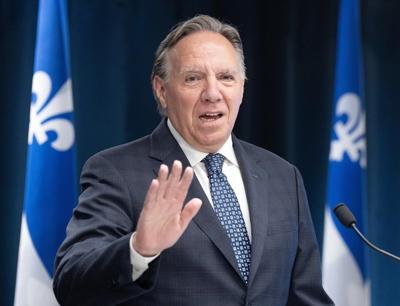MONTREAL - Quebec Premier François Legault has announced a six-month freeze on certain temporary foreign worker applications in Montreal, in a move intended to put pressure on Ottawa to reduce the number of non-permanent residents in the province.
The Coalition Avenir Québec government is also planning to table a bill this fall to give the province the power to limit the number of international students in certain schools.
Together, Legault claimed the two measures will help relieve pressure on housing, education, and health care, and will help protect the French language in Montreal. "What we're announcing today is a first step," he said. "We have an obligation to reduce the number of temporary immigrants to protect our public services."
Legault said that in the last two years, the number of temporary immigrants in Quebec has doubled to 600,000 from 300,000, which he called a "real explosion."
The new moratorium, which will take effect Sept. 3, is only expected to make a very small dent in that number. By the end of six months, Legault estimated there would be 3,500 fewer temporary foreign workers in Montreal. That's because the federal government is responsible for two-thirds of temporary immigrants in Quebec, he said, including asylum seekers.
Of the 180,000 non-permanent residents under Quebec's jurisdiction, most are international students. Legault said just 12,000 are temporary foreign workers in Montreal – the group targeted by this new measure. The premier said the moratorium will apply to new applications and renewals, but people working in education, health care, construction, agriculture, food processing and those making at least $57,000 a year – Quebec's median salary – will be exempt.
The Quebec government has been urging Ottawa to halve the number of non-permanent residents in the province under federal jurisdiction, from 420,000 to 210,000. Legault said he hopes Tuesday's announcement will prove to the federal government that Quebec is doing its part.
"I think we have to show an example, because we're putting lot of pressure since almost a year on (Prime Minister) Justin Trudeau," he said. "It's urgent that the federal government act quickly."
A spokesperson for federal Immigration Minister Marc Miller said the Liberal government will work with Quebec to "look at ways of reducing temporary immigration," but didn't commit to any timeline for announcing concrete measures.
In a statement, Employment Minister Randy Boissonnault said he approved the six-month freeze and "will closely monitor this policy change." Earlier this month, Boissonnault announced he's considering preventing certain employers from using the low-wage stream of the temporary foreign worker program.
Business groups, however, are sounding the alarm. "The businesses most affected will be small businesses already struggling with liquidity, financing, procurement, recruitment and workforce retention challenges in a still uncertain economic context," said Michel Leblanc, president of the Chamber of Commerce of Metropolitan Montreal, in a statement.
The chamber opposes any measure specifically targeting businesses on the Island of Montreal, Leblanc said.
Karl Blackburn, president of the Conseil du patronat, said the freeze will cause problems for employers that depend on the temporary foreign worker program to fill vacant positions in the service sector, retail, catering and manufacturing.
Legault also announced Tuesday that his government will table new legislation this fall to take aim at the 120,000 international students in the province. He said the bill will give the government the power to cap the number of foreign students at certain schools, to stop what he called "abuses" at some institutions.
The premier offered few details, and would not say whether English-language universities in Montreal would be targeted by the bill.
The federal government will "monitor this situation very closely," Miller's spokesperson said. “What is clear is we will not tolerate any form of discrimination. It would be unfair to punish anglophone students wishing to go to an anglophone university in Quebec, as much as it would be unfair to punish francophone students wishing to go to a francophone university."
This report by Ďă¸ŰÁůşĎ˛ĘąŇĹĆ×ĘÁĎ was first published Aug. 20, 2024.
- With files from Morgan Lowrie








































